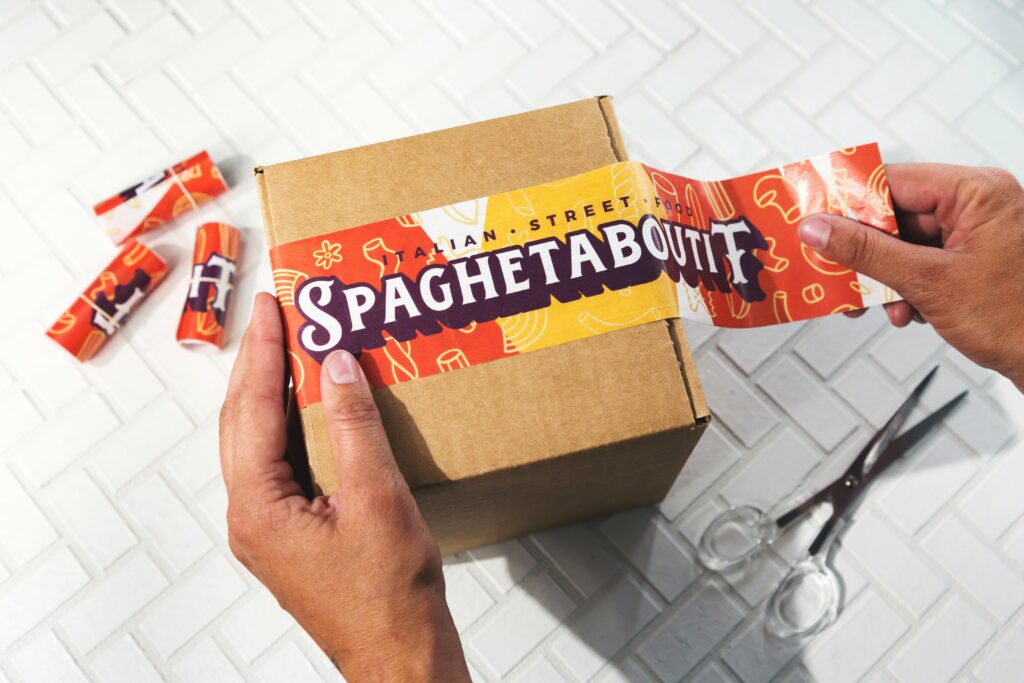Self-adhesive label is a special label on goods, which provides customers with the necessary information about the product manufacturer, composition, barcode, and other data about the labeled product. Such stickers are in demand due to their low cost and ease of use. It is used for marking goods in warehouses, production, offices, supermarkets, and shopping centers.
Self-stick labels are the basis for product design, regardless of their specifics. These products include food, pharmaceuticals, cosmetics, perfumes, household chemicals, industrial products, children’s toys, frozen products, and much more. Food label stickers are applied when labeling bottles, glasses, cans, and packaging, as well as in chemical and cosmetic production.

This is an economical way to produce marking products, providing additional advantages in their storage and transportation. Roll winding is compact, provides protection from external influences, and is convenient for automatic or manual application or the use in a label printer.
Types of Self-Adhesive Products
According to the type of material, labels are divided into:
- Paper stickers. The most common ones. They are low-cost and contain the necessary information. Such markers are used for sticking food and other consumer goods.
- Synthetic labels. They are made from polypropylene, polyester, and polyethylene. They are resistant to abrasion, temperature extremes, and high humidity. This type of consumables is used for fresh frozen products, large building materials, paints, and petrochemicals.
- Self-adhesive stickers. They are developed from synthetic materials, depending on the characteristics of the further use of marked goods. They are used for marking tires and providing additional protection of goods from unauthorized opening.
Taking into account the type of printing, users can choose between the following kinds of stickers:
- ECO label without a protective layer. It is used for marking products with a short shelf life. They quickly lose their quality when exposed to moisture, direct sunlight, abrasion, and other negative influences. The ECO thermal label is applied to the product immediately before the sale.
- TOP products with a protective layer. A laminated layer protects from external influences: dust, moisture, and mechanical damage. The product is suitable for use at high humidity and sub-zero temperatures; it is used for marking products that need to be frozen, transported, and stored for a long time (fish, meat, other food).
Thermal transfer printing requires an additional consumable – an ink ribbon. Under the influence of high temperature and conditions of high intensity, the ink layer transfers from the tape to the label surface. The following consumables are used for printing thermal transfer stickers: paper, matte, glossy, and varnished cardboard, and synthetic materials (PP, PE, PET, and nylon).
Technologies used for the Production of Self-Adhesive Labels
- Offset printing is a method of transferring an image from a template to paper, plastic, or polyethylene. Embossing is not transferred directly but through a special shaft. The resulting image is not a mirror but a direct one.
The method implies using two components – a viscous paint and a moisturizing solution.
This technology allows users to get an image of only one color (the paint used in colorful rollers). To obtain a colorful image, images of different colors are sequentially applied to the printed material.
- Flexo Multicolor printing is a direct high-speed rotary printing with quick-drying liquid inks using elastic printing plates mounted on plate cylinders with different circumferences.
Types of Finish
The self-adhesive stickers consist of the following layers:
- a surface material – paper, cardboard, foil, film.
- a transparent adhesive layer.
- a separating layer, used only in the label printing process.
- a substrate is a special paper on which stickers are placed.
Two types of substrates are distinguished – a durable smooth paper, on the surface of which a layer of silicone is applied, or a film, made of thin polyethylene. The latter solution increases the speed of labeling goods, is resistant to excessive moisture, and is easy to recycle.
It is possible to apply foil for hot stamping and foil for lamination, which is a multilayer material, with a metalized or colorful coating. Such a foil is used to transfer the shape and contours of a three-dimensional image from the template to any surface. The image is applied under pressure or at high temperatures. Marking of goods or packaging is carried out immediately after printing and cutting.
Now, you have a clear vision of what are self-adhesive labels and what they are for. Several types of products are distinguished. They have features and are applied to different industries and types of products. Types of digital printing also differ.

